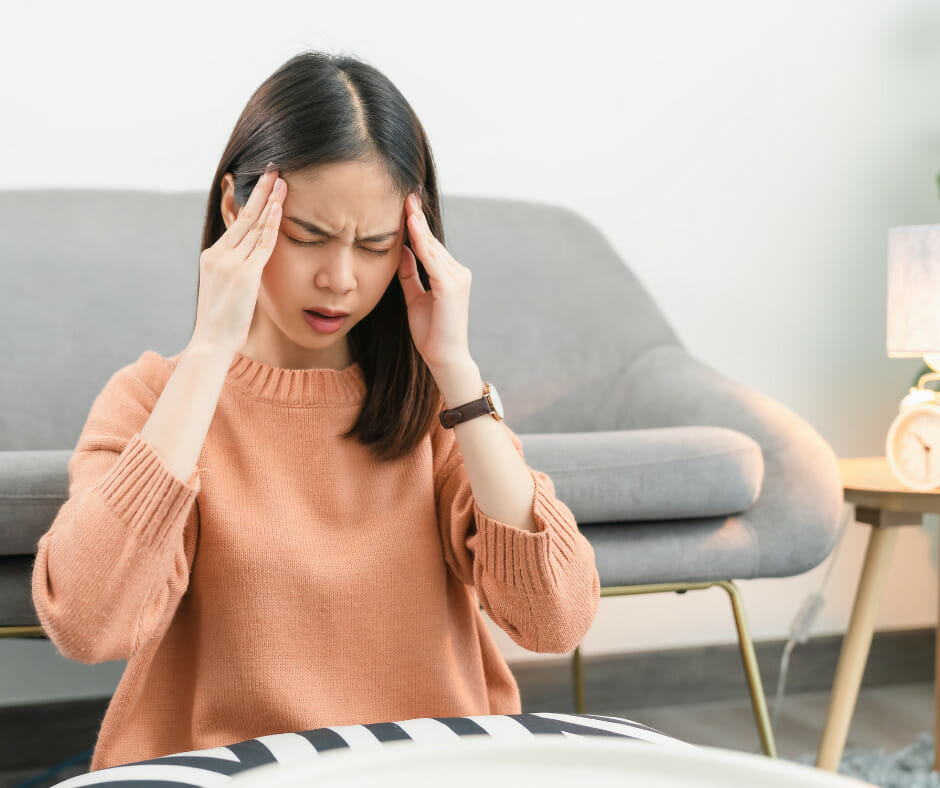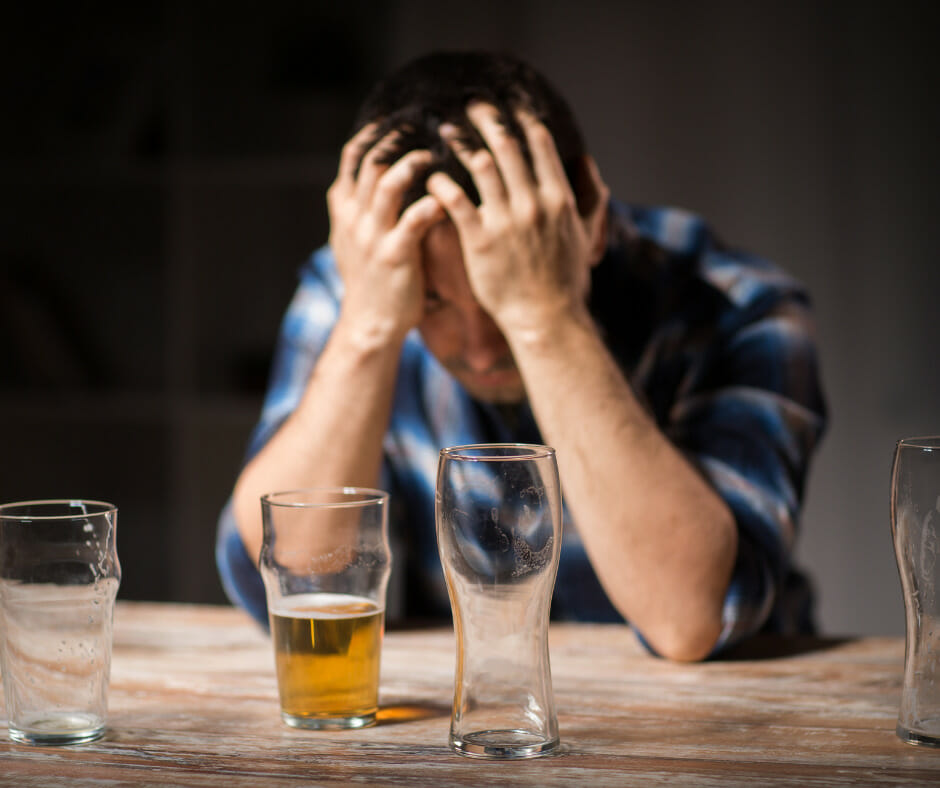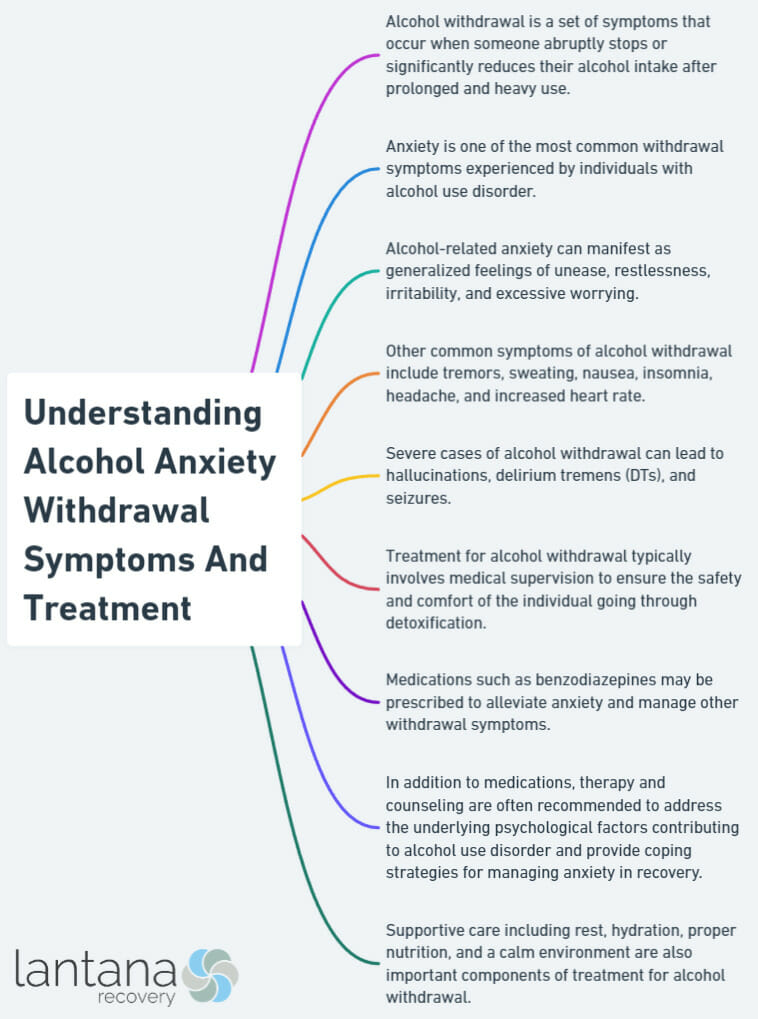Are you or someone you know struggling with alcohol anxiety withdrawal? It can be a daunting and overwhelming experience, but understanding the connection between alcohol withdrawal and anxiety, along with knowing the available treatments, can make the journey to recovery less intimidating. In this blog post, we’ll explore the reasons behind alcohol anxiety withdrawal, how to identify its symptoms, and various treatment options to help you or your loved one regain control and maintain long-term recovery.
Key Takeaways
- Excessive alcohol consumption can lead to neurotransmitter imbalances in the brain, resulting in mild to severe symptoms.
- Identifying physical and emotional/cognitive symptoms is essential for providing appropriate treatment and support.
- An integrated treatment approach combining medical treatments with lifestyle changes and an adequate support network can facilitate successful long-term recovery from alcohol addiction and anxiety.
Alcohol Anxiety Withdrawal: The Connection

Withdrawal symptoms are an unfortunate consequence of alcohol abuse, and anxiety is a common affliction during this challenging time. But what is the connection between alcohol withdrawal and anxiety?
Prolonged and excessive alcohol consumption conditions the central nervous system to the suppressive effect of alcohol on the brain’s ‘fight or flight’ response. So, when alcohol consumption is abruptly stopped, the brain and nervous system react strongly, resulting in severe withdrawal symptoms, including delirium tremens or seizures.
Neurotransmitter Imbalance
One of the underlying causes of alcohol anxiety withdrawal is the imbalance of neurotransmitters in the brain. Excessive alcohol consumption triggers mental health changes, such as imbalances in neurotransmitter and serotonin levels, suggests a research published in Alcohol Health and Research World. This can result in mild symptoms of alcohol withdrawal, such as diminished sensitivity of GABA receptors in the brain. As one continues to drink heavily, a phenomenon known as kindling occurs, which results in increasingly severe neurochemical imbalances and potentially withdrawal seizures.
Severe withdrawal symptoms can disrupt the transmission of nerve signals in the central nervous system, a process vital for proper brain function. The synapse is a tiny gap between neighboring neurons. It is through this minute gap that neurotransmitter molecules enter the signal-receiving neuron, interacting with the docking molecules there. The disruption of this process during alcohol withdrawal can lead to anxiety, panic attacks, and other severe symptoms.
Alcohol as a Coping Mechanism
Many people turn to alcohol as a coping mechanism for stress, anxiety, or difficult emotions. However, relying on alcohol to cope can exacerbate anxiety symptoms when one stops drinking. The use of alcohol as a coping mechanism is associated with:
- physical and psychological dependency
- an increased risk of developing an alcohol use disorder
- heightened anxiety
- depression
- other mental health issues
Instead of using alcohol as a coping mechanism, individuals can engage in activities such as:
- exercise
- meditation
- talking to a friend
- engaging in a hobby
These alternatives can help individuals experience mild withdrawal symptoms instead of severe ones, reducing the risk of complications and promoting a healthier lifestyle.
Identifying Alcohol Anxiety Withdrawal Symptoms

Appropriate treatment and support depend on the recognition of alcohol anxiety withdrawal symptoms. Common indications of alcohol withdrawal include physical manifestations like rapid heartbeat, sweating, and trembling, as well as emotional and cognitive manifestations such as irritability, restlessness, and difficulty focusing.
In some cases, alcohol withdrawal seizures may also occur. Differentiating these symptoms from general withdrawal ones is important for administering the correct care and treatment.
Physical Symptoms
Specific physical symptoms associated with alcohol anxiety withdrawal include:
- Gastrointestinal issues like cramps, diarrhea, or nausea
- Increased heart rate
- Rapid breathing
- Severe sweating
To manage these gastric issues during alcohol withdrawal, it is advisable to avoid spicy foods. If an individual is experiencing increased heart rate, rapid breathing, and severe sweating, it is essential that they seek medical attention immediately.
Other physical symptoms related to alcohol anxiety withdrawal include rapid heartbeat, blood pressure fluctuations, and trembling. Being able to identify these physical symptoms can help individuals seek timely treatment, reducing the risk of complications and promoting a smoother withdrawal process.
Emotional and Cognitive Symptoms
Emotional and cognitive symptoms associated with alcohol anxiety withdrawal can include:
- Anxiety
- Irritability
- Restlessness
- Difficulty concentrating
- Confusion
- Mood swings
Anxiety symptoms during withdrawal can manifest as feelings of fear, worry, and panic, accompanied by physical signs such as increased heart rate, sweating, and trembling, which are common when experiencing withdrawal symptoms.
Recognizing these emotional and cognitive symptoms is just as important as identifying physical symptoms, as they can significantly impact an individual’s daily functioning and overall well-being. Being aware of these symptoms can help individuals seek the necessary support and treatment to manage their alcohol withdrawal effectively and safely.
Managing Alcohol Anxiety Withdrawal at Home

Those with mild alcohol anxiety withdrawal symptoms might be able to manage the withdrawal process at home. Nevertheless, they should be accompanied by someone to guarantee appropriate care and prevent symptom escalation.
There are several ways to manage alcohol anxiety withdrawal at home, such as:
- Consuming adequate fluids
- Having a cold shower
- Consuming fruits and vegetables
- Attempting deep breathing exercises and meditation
These methods can help reduce withdrawal symptoms and promote a healthier recovery.
Noticing skin rashes and itching during alcohol withdrawal period? Read our article to find out what causes it and how to treat the itching.
Lifestyle Changes
Implementing lifestyle changes can significantly help alleviate anxiety symptoms during withdrawal. Engaging in physical activity, such as walking, running, swimming, or yoga, can be highly beneficial in reducing anxiety symptoms. Exercise not only improves physical health, but also releases endorphins, which are natural mood elevators that can help combat anxiety and depression.
Practicing relaxation techniques, such as deep breathing, progressive muscle relaxation, and guided imagery, can also help reduce anxiety symptoms during withdrawal. Additionally, maintaining proper sleep hygiene by establishing a regular sleep schedule, avoiding caffeine and alcohol before bed, and avoiding screens before bed, can assist in reducing anxiety symptoms during withdrawal by aiding in regulating the body’s natural sleep-wake cycle.
Support Network
A support network during withdrawal is invaluable, offering emotional and practical help, fostering accountability, and providing motivation. Additionally, a strong support network can help mitigate feelings of loneliness and isolation during the withdrawal process. Some approaches to seeking assistance include joining support groups, conversing with trusted individuals, and consulting with a professional therapist or counselor.
Examples of support networks include:
- Alcoholics Anonymous
- SMART Recovery
- Other 12-step programs
- Family
- Friends
- Online support groups
Having a strong support network can make a significant difference in the recovery process and long-term success of overcoming alcohol anxiety withdrawal.
Medical Treatment Options for Alcohol Anxiety Withdrawal

Those experiencing acute alcohol withdrawal may require medical treatment options for safe and effective management of severe alcohol dependence and anxiety withdrawal symptoms, often resulting from excessive alcohol intake.
Medical treatments and medications available for managing severe alcohol anxiety withdrawal symptoms include benzodiazepines, alternative medications such as beta-blockers and anticonvulsants, and inpatient care when necessary.
Benzodiazepines
Benzodiazepines play a significant role in treating alcohol anxiety withdrawal, as they can inhibit certain withdrawal reactions from progressing to more serious outcomes. However, there is a potential risk associated with the use of benzodiazepines for the treatment of alcohol anxiety withdrawal, as they may not fully address the underlying causes of alcohol addiction and anxiety.
Despite this risk, benzodiazepines provide a protective benefit against alcohol withdrawal symptoms, particularly seizures. There is no definitive answer on the preferred benzodiazepine to use for the treatment of alcohol anxiety withdrawal, but they are often prescribed for their ability to stabilize the patient and reduce the risk of seizures and other severe withdrawal symptoms.
Infact, as reported by a meta-analysis conducted by experts at St. Joseph’s Hospital, Ontario, benzodiazepine should be recommended course of treatment for treating for acute withdrawal symptoms
Alternative Medications
Medications such as benzodiazepines are often used to treat alcohol anxiety withdrawal. There are other medications that can also be prescribed to treat this condition. These alternative medications include:
- Anticonvulsants
- Antipsychotics
- Beta blockers
- Alpha-adrenergic agonists
Although the efficacy and safety of alternative medications may not be consistent, it is recommended to seek advice from a healthcare professional before attempting any alternative treatments.
Medications such as naltrexone, acamprosate, and disulfiram are commonly prescribed to reduce the risk of relapse in alcohol addiction. These medications can help individuals maintain their recovery and prevent relapse by reducing cravings and promoting abstinence from alcohol.
Preventing Relapse and Maintaining Recovery

A crucial part of the recovery process is preventing relapse and maintaining long-term recovery from alcohol addiction and anxiety. Continuous support and access to resources, such as therapy, medications for alcohol use disorder, and lifestyle modifications, can be beneficial in helping individuals maintain sobriety in the long term.
Ongoing Therapy
Ongoing therapy is crucial for addressing the underlying causes of alcohol addiction and anxiety and maintaining long-term recovery. This can involve individual counseling, group therapy, or family/couples counseling, depending on the individual’s needs. Sustained therapy can assist individuals in tackling the root causes of their alcoholism and anxiety, managing alcohol withdrawal symptoms, cultivating more beneficial coping strategies, and improving communication techniques.
To locate a therapist, individuals can seek referrals from acquaintances and relatives, conduct internet searches, or consult their insurance companies. It is essential to find a therapist who is knowledgeable in managing alcohol addiction and anxiety to provide the most effective support and guidance.
Medications for Alcohol Use Disorder
Medications for alcohol use disorder can play a significant role in preventing relapse and maintaining recovery. Commonly prescribed medications include:
- Acamprosate, which reduces alcohol cravings and assists in maintaining abstinence
- Naltrexone, which blocks the effects of alcohol and reduces cravings
- Disulfiram, which causes unpleasant physical reactions when alcohol is consumed
These medications can be particularly helpful for individuals who struggle with cravings or who have a history of relapse. By addressing the physical aspects of alcohol addiction, these medications can support individuals in their journey towards long-term recovery and improved mental health.
Alcohol Anxiety Withdrawal and Co-occurring Disorders

Alcohol anxiety withdrawal can lead to the development of co-existing mental health disorders, such as depression or other types of anxiety. Understanding the link between alcohol anxiety withdrawal and co-occurring mental health disorders is fundamental to seeking appropriate treatment and support. Insufficient management of alcohol withdrawal syndrome can lead to severe outcomes like brain damage or even death.
Identifying Co-occurring Disorders
It is essential to recognize the signs of co-occurring mental health disorders during alcohol withdrawal. Indicators of co-occurring disorders may include:
- Neglecting personal hygiene
- Engaging in hazardous behavior
- Experiencing depression or anxiety
- Struggling to fulfill responsibilities
- Distancing from relationships with family and friends
- Abrupt changes in behavior
- Having difficulty performing daily tasks
- Triggers abdominal pain in alcohol withdrawal
Obtaining appropriate treatment for co-occurring disorders is crucial in order to regulate symptoms and sustain recovery. By addressing both alcohol addiction and co-occurring mental health disorders, individuals can improve their overall well-being and increase their chances of long-term recovery.
Fact: According to SAMHSA’s 2021 National Survey on Drug Use and Health, approximately 9.2 million adults in the United States have a co-occurring disorder.
Integrated Treatment Approach
An integrated treatment approach offers a comprehensive and holistic approach to healthcare, addressing both alcohol addiction and co-occurring mental health disorders. This approach involves collaboration between different healthcare professionals, such as doctors, therapists, and social workers, to provide coordinated and holistic care. Furthermore, it can reduce the risk of relapse and improve the chances of successful recovery.
Strategies for implementing an integrated treatment approach include:
- Devising a comprehensive treatment plan that accounts for both alcohol addiction and any co-occurring mental health disorders
- Offering access to various therapeutic modalities like cognitive-behavioral therapy and psychotherapy
- Fostering a supportive environment that encourages individuals to take an active role in their recovery
Summary
In conclusion, understanding the connection between alcohol withdrawal and anxiety, identifying alcohol anxiety withdrawal symptoms, and seeking appropriate treatments are essential steps for individuals struggling with alcohol addiction and anxiety. Implementing lifestyle changes, building a strong support network, and addressing co-occurring mental health disorders through an integrated treatment approach can significantly improve one’s chances of long-term recovery and overall well-being.
We hope that this blog post has provided valuable insights and guidance on managing alcohol anxiety withdrawal and maintaining recovery. Remember that you are not alone in this journey, and that with the right support and resources, a healthier and happier life is possible.
Frequently Asked Questions
Can quitting alcohol cause anxiety?
Quitting alcohol can indeed cause anxiety due to withdrawal symptoms such as increased body sensitivity.
However, this anxiety is usually short-lived and can be managed with the help of a doctor or therapist. With the right support, it is possible to overcome the anxiety.
Does detoxing cause anxiety?
Detoxing can lead to panic attacks and a sense of impending doom, both of which can cause anxiety.
Anxiety can be a difficult condition to manage, but there are ways to reduce its effects. For example, engaging in regular exercise, eating a balanced diet, and getting enough sleep can all help.
Why don’t I feel better after quitting drinking?
Your body may be going through physical withdrawal symptoms such as being over-excitable, anxious or shaky due to overproducing glutamate and under-producing GABA.
These physical symptoms may take up to 72 hours to subside and your brain chemistry must also adjust, which can cause depressive symptoms in the meantime.
What are some common physical symptoms associated with alcohol anxiety withdrawal?
Common physical symptoms associated with alcohol anxiety withdrawal include rapid heartbeat, sweating, trembling, and gastrointestinal issues like cramps, diarrhea, or nausea.
These symptoms can be uncomfortable and can last for several days or weeks. It is important to seek medical help if these symptoms become severe or persist for an extended period of time.
What medications can help prevent relapse in alcohol addiction?
Medications such as naltrexone, acamprosate, and disulfiram can help reduce the risk of relapse in alcohol addiction and maintain recovery.
The post Understanding Alcohol Anxiety Withdrawal Symptoms and Treatment appeared first on Lantana Recovery: Addiction Treatment Rehab Center.
source https://lantanarecovery.com/alcohol-anxiety-withdrawal/

No comments:
Post a Comment